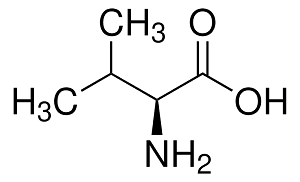L-Valine

Product Description
L-Valine is one of the essential amino acids that the human body cannot produce on its own and must obtain from dietary sources.
Product:
L-Valine
CAS:
72-18-4
Synonym:
(S)-α-Aminoisovaleric acid; L-2-Amino-3-methylbutanoic acid
Structure:

Typical Characteristics
Appearance
White powder
Density
1.32 g/cm3
Melting point
315°C (decomposes)
Molecular Weight
117.15
Odor
Odorless
Purity
≥98%
Refractive index
1.461
Uses, Applications & Markets
Key applications
get a quote



L-Valine used in many
industry applications
L-Valine is one of the essential amino acids that the human body cannot produce on its own and must obtain from dietary sources. It serves various industrial purposes, including:
- Dietary Supplements: L-Valine is commonly used in dietary supplements and sports nutrition products due to its role in protein synthesis and muscle repair. It is often included in formulations designed to support muscle growth, recovery, and overall athletic performance.
- Pharmaceuticals: In the pharmaceutical industry, L-Valine is utilized as an ingredient in the synthesis of various drugs and medications. It may be incorporated into formulations for parenteral nutrition, where it helps maintain nitrogen balance and supports tissue repair.
- Animal Feed: L-Valine is added to animal feed, particularly for livestock and poultry, to ensure adequate levels of essential amino acids in their diets. It contributes to protein synthesis, growth, and overall animal health.
- Food and Beverage: It may be used as a flavor enhancer or nutritional additive in food and beverage products. L-Valine can improve the taste and nutritional profile of certain formulations, especially those targeting athletes and individuals with increased protein needs.
- Biotechnology: L-Valine is employed in various biotechnological processes, including the production of recombinant proteins and therapeutic antibodies. It serves as a crucial component in cell culture media for the growth and maintenance of mammalian cell lines.
- Chemical Synthesis: It is used as a building block in organic synthesis reactions to create a wide range of chemical compounds. L-Valine's unique chemical properties make it valuable in the production of pharmaceutical intermediates, agrochemicals, and specialty chemicals.
- Cosmetics and Personal Care: L-Valine may be included in cosmetic formulations for its potential benefits to skin and hair health. It is believed to support collagen synthesis and promote hair growth, making it a sought-after ingredient in certain skincare and haircare products.
- Research and Development: L-Valine is utilized in scientific research to study its physiological effects and metabolic pathways. Researchers investigate its role in various biological processes, including muscle metabolism, neurological function, and disease mechanisms.